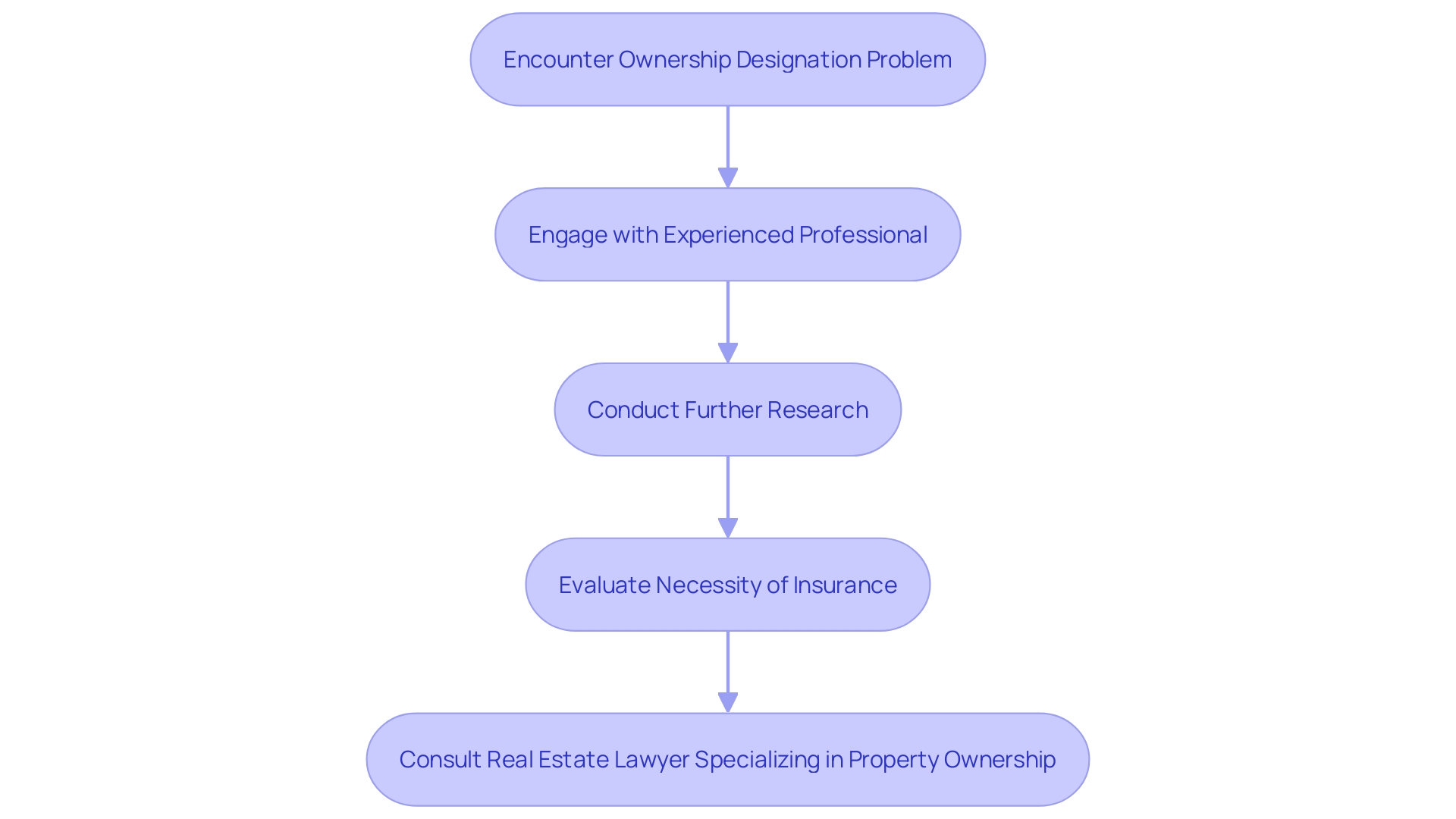Introduction
When it comes to real estate transactions, having a clear title is of utmost importance. The title is the definitive term that establishes the rightful ownership of a property, ensuring that there are no encumbrances or claims that could challenge ownership in the future. This article explores the significance of clear titles, highlighting real-life examples of title disputes and the potential ramifications they can have on individuals.
It also delves into the responsibilities of conducting a title search, emphasizing the need for thorough research to confirm ownership and mitigate risks. Additionally, the article provides insights into how to perform a property title search effectively, utilizing online databases and cross-verifying information. Lastly, it offers guidance on what to do if title issues are encountered during the search process, such as engaging with a title professional, conducting further research, considering title insurance, and seeking legal advice.
By following these steps, individuals can ensure that their property's title is clear and marketable, allowing for confident real estate transactions.
Why is a Clear Title Important?
The importance of having a clear ownership when dealing with real estate cannot be underestimated. A designation, separate from a deed, is the conclusive word that specifies the of a possession. Unlike a deed, which is a documented contract, a title is the conceptual acknowledgment of possession. This differentiation is vital in guaranteeing that when someone purchases or sells a real estate, the , free from any burdens or assertions that could subsequently reappear to contest the property's ownership.
Consider the case of Mike, who, after a successful career, purchased a substantial estate in Buckinghamshire. Years later, he found himself caught up in a bitter disagreement, contesting his son Tom about the control of the house, located on the land. This situation emphasizes the complexities that can arise when ownership conflicts are not properly addressed.
Echoing this point of view, Joshua Martin from Atticus Home Buyers highlights the significance of legally binding contracts, particularly in situations where the possession of assets might be shared or unclear, to avoid potential complications in the event of a change in the relationship.
Further demonstrating the possible consequences of disputes over property ownership, a recent tragic story disclosed by Los Angeles-based realtor Rebecca Chambliss involved a woman who lost her house to a man she was planning to marry, due to insufficient safeguards regarding the home's ownership.
The possession of a property is not simply a transactional affair but a cornerstone of legal and financial stability. According to First American Financial Corporation, a leader in the domain of title and settlement solutions, the company's success, with revenues of $7.6 billion in 2022, is a testament to the critical role in the security of real estate transactions. This is echoed by the sentiment of many Americans, with approximately 83% of non-homeowners yearning for homeownership, yet financial barriers often impede this dream.
In any real estate transaction, the clarity and certainty of property possession are paramount. It serves as a protective shield for the buyer's investment and peace of mind, allowing them to fully exercise their rights of possession without fear of future legal complications.
Who is Responsible for a Title Search?
A is a crucial step for prospective buyers of , as well as for real estate agents and lawyers, to ensure that the land in question has a and is free from any legal burdens that could impact the rights of ownership. It is a complex procedure that involves examining a property's history to verify the legitimate ownership and uncover any inconsistencies or assertions that might exist. In a real-world example, our team recently assisted a client in navigating the complexities of purchasing an Akiya, or vacant house, in Japan. The client sought to reside near the picturesque Chiba Prefecture beaches, expressing their preferences through detailed consultations. The pursuit involved thorough research, where hundreds of locations were evaluated against the client's criteria before narrowing down to five suitable Akiya options. This highlights the comprehensive scope of searches, which can be time-consuming but are essential in reducing risks and ensuring peace of mind for buyers. In addition, lenders frequently require a search of the property's ownership to protect their financial investment. The changing landscape of the escrow and closing industry, characterized by the , is reshaping how these searches are conducted. This streamlines the process, offering more efficient and accurate outcomes. As reported, major insurance organizations are adapting to these changes, navigating the challenges of conspiracies, and striving to maintain the integrity of their services. The crucial significance of a title—as different from a deed—cannot be emphasized enough, as it symbolizes lawful possession. Without a proper designation correctly assigned to an individual or entity, of a real estate is not established. This differentiation is essential for anyone seeking to update or enhance their real estate, as possessing the ownership is a requirement for such endeavors. First American Financial Corporation exemplifies the industry's commitment to excellence, achieving recognition for its workplace culture and innovative practices, while generating a substantial revenue of $7.6 billion in 2022. The company's success is a testament to the significance of dependable and settlement services in real estate transactions. As the field continues to develop, the function of searches for names remains fundamental, guaranteeing safe and assured transactions.
How to Perform a Property Title Search
A thorough search of the complete is an essential step in , guaranteeing that the ownership is unencumbered and can be transferred. A meticulous approach to this process can prevent future legal problems and financial losses. To perform a thorough search for a , start by collecting the necessary details about the premises, including its location, name of the owner, and past records. Use , frequently offered by regional authorities, to obtain records of ownership and details of titles. Examine these records to establish a , and discover any liens or encumbrances that may affect the asset. Cross-verification with reliable sources is essential to confirm the accuracy of the data obtained. Complicated problems may occur, requiring the skills of a specialist to untangle complexities and offer clarity.
In light of recent events, such as allegations against RealPage for potentially manipulating rental markets, it is evident that about real estate is crucial for market integrity. Moreover, charges imposed on data inquiries, as denounced by the Office of the Information and Privacy Commissioner, can impede access to real estate data, highlighting the significance of easily accessible and reasonably priced information for conducting . As the real estate market evolves, with a variety of digital tools at our disposal, the process of research on ownership continues to become more accessible and efficient, allowing for more informed decisions in real estate transactions.

What to Do If You Encounter Title Issues
Navigating the intricacies of ownership designations can be daunting, and encountering problems with designations during the search process is not uncommon. If you find yourself facing such issues, consider the following steps to mitigate the situation:
- Engage with an : When potential issues arise, enlisting the help of a seasoned expert is crucial. Their expertise will be invaluable in evaluating the situation and advising on how to rectify any concerns, potentially averting significant impacts on .
- Explore more with : Sometimes, resolving discrepancies in the name requires further investigation. This could entail examining more documents, interviewing relevant parties, or consulting with subject matter experts to unearth the root of the issue.
- Evaluate the necessity of insurance: To protect your investment, . It provides a safety net against unexpected defects and claims, offering peace of mind in the event of unforeseen complications.
- Consult with a lawyer who specializes in when confronted with complex issues regarding property ownership. Their legal acumen can help decipher the complexities and guide you through the steps necessary to resolve the matter.
Prompt and thorough action is key to ensuring your property's ownership is clear and marketable. With the right professional assistance and a proactive approach, you can address any and move forward with your real estate transaction confidently.

Conclusion
In conclusion, a clear title is paramount in real estate transactions to establish ownership and avoid future disputes. Thorough title searches, utilizing online databases and cross-verification, are vital in confirming ownership and identifying any issues.
When encountering title problems, engaging a title professional, conducting further research, considering title insurance, and seeking legal advice are recommended steps to address the challenges effectively.
By following these measures, individuals can ensure their property's title is clear and marketable, enabling confident real estate transactions. The commitment of companies like First American Financial Corporation underscores the significance of reliable title searches in securing property transactions.
In summary, a clear title is crucial for legal and financial stability in real estate. Thorough searches, professional assistance, and proactive actions are key to addressing title issues and facilitating smooth transactions.
Frequently Asked Questions
Why is clear ownership important in real estate?
Clear ownership is crucial because it establishes who the legitimate owner of a property is, ensuring that any transactions (buying or selling) are legally secure and free from disputes or claims that could arise later.
What is the difference between a title and a deed?
A title is the conceptual acknowledgment of ownership, while a deed is a documented contract that transfers ownership. The title confirms lawful possession, whereas the deed serves as the physical record of that transfer.
Can you provide an example of ownership disputes in real estate?
One example is the case of Mike, who faced a bitter conflict with his son over the ownership of a house. This highlights how important it is to have clear and legally recognized ownership to prevent such disputes.
What role do legally binding contracts play in real estate transactions?
Legally binding contracts are essential to clarify ownership and prevent complications, especially when ownership might be shared or ambiguous. They help protect all parties involved.
What is a title search, and why is it necessary?
A title search is a thorough investigation of a property's ownership history to verify legitimate ownership and identify any legal burdens that could affect ownership rights. It is crucial for buyers, agents, and lawyers to ensure a clear title before proceeding with a transaction.
How can technology impact the title search process?
Advancements in artificial intelligence are streamlining title searches, making them more efficient and accurate. This technological integration helps mitigate risks related to mortgage fraud and enhances the integrity of real estate transactions.
What steps should be taken for a thorough ownership search?
To conduct a thorough ownership search, one should: collect details about the property, such as location and past ownership records; use online databases provided by local authorities to find ownership records; examine these records for any liens or encumbrances; and cross-verify the information with reliable sources.
What should I do if I encounter issues during the ownership designation search?
If you face issues, consider the following steps: engage an experienced professional to help assess and resolve the situation; conduct further research to clarify discrepancies; evaluate the need for insurance to protect against unforeseen claims; and consult a real estate lawyer for complex ownership issues.
Why is it essential to have accurate and transparent information about real estate?
Accurate information ensures market integrity and helps prevent disputes. Recent events have highlighted the risks of misleading data in real estate transactions, making transparency vital for all parties involved.
How can I ensure my property ownership is clear and marketable?
Prompt action, thorough research, and professional assistance are key to ensuring clear ownership. Address any title challenges quickly with the help of qualified experts to confidently proceed with your real estate transactions.




